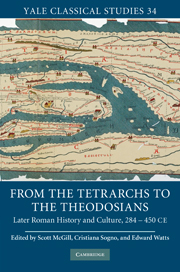Book contents
4 - Constantine the lawgiver
from PART I - POLITICS, LAW, AND SOCIETY
Published online by Cambridge University Press: 04 August 2010
Summary
Nearly sixty years before Constantine was proclaimed at York on 25 July 306, Philip the Arab celebrated the conclusion of Rome's first millennium. Constantine, therefore, was the product of Rome's eleventh century, the first fifty years of which had been dominated by military emperors. Constantine himself claimed descent from one, Claudius II Gothicus. The soldier-emperors' priority had been the security of the empire, and their focus had been the frontiers, far from Rome. Like them, Constantine seldom visited the ancient capital after 312, returning only for his decennalia in 315 and vicennalia in 326. Much of the rest of his reign was spent on the move. Constantine's role as a military leader in charge of a mobile court, which, by his own account, was more like a camp, also had an impact on his legislation: his palatini were granted the soldiers' legal right to hold property independently as peculium castrense, because, despite being scholarly civilians, they shared the hardships of the military life – dust, toil, and long marches.
Among the long-suffering palatini were, perhaps, the emperor's jurists. The sidelining of the ancient capital, with its long tradition of legal education and learned interpretation of statutes and custom, may have been one element in the decline of the independent jurist. Herennius Modestinus, the pupil of Ulpian of Tyre, had flourished under the Gordians (he is last heard of in 239), and his successors were few and obscure: Arcadius Charisius, the latest jurist cited by the Digest, may have been known to Constantine but is a shadowy figure, as also are Gregorius and Hermogenianus, compilers of the Diocletianic collections of rescripts in 292 and 294–5, and the native of North Africa known as Paulus, who composed the Sententiae, probably late in the reign of Diocletian.
- Type
- Chapter
- Information
- From the Tetrarchs to the TheodosiansLater Roman History and Culture, 284–450 CE, pp. 73 - 92Publisher: Cambridge University PressPrint publication year: 2010
- 1
- Cited by



